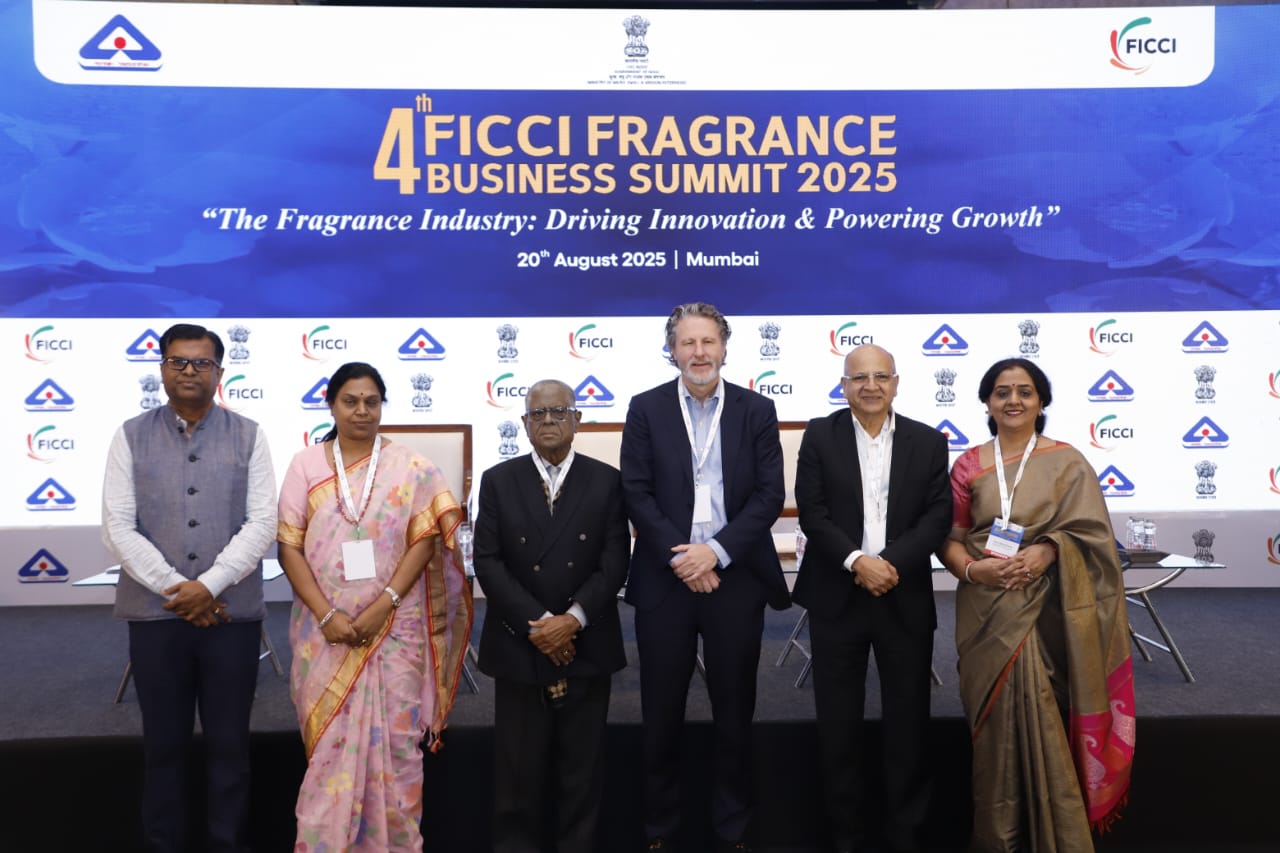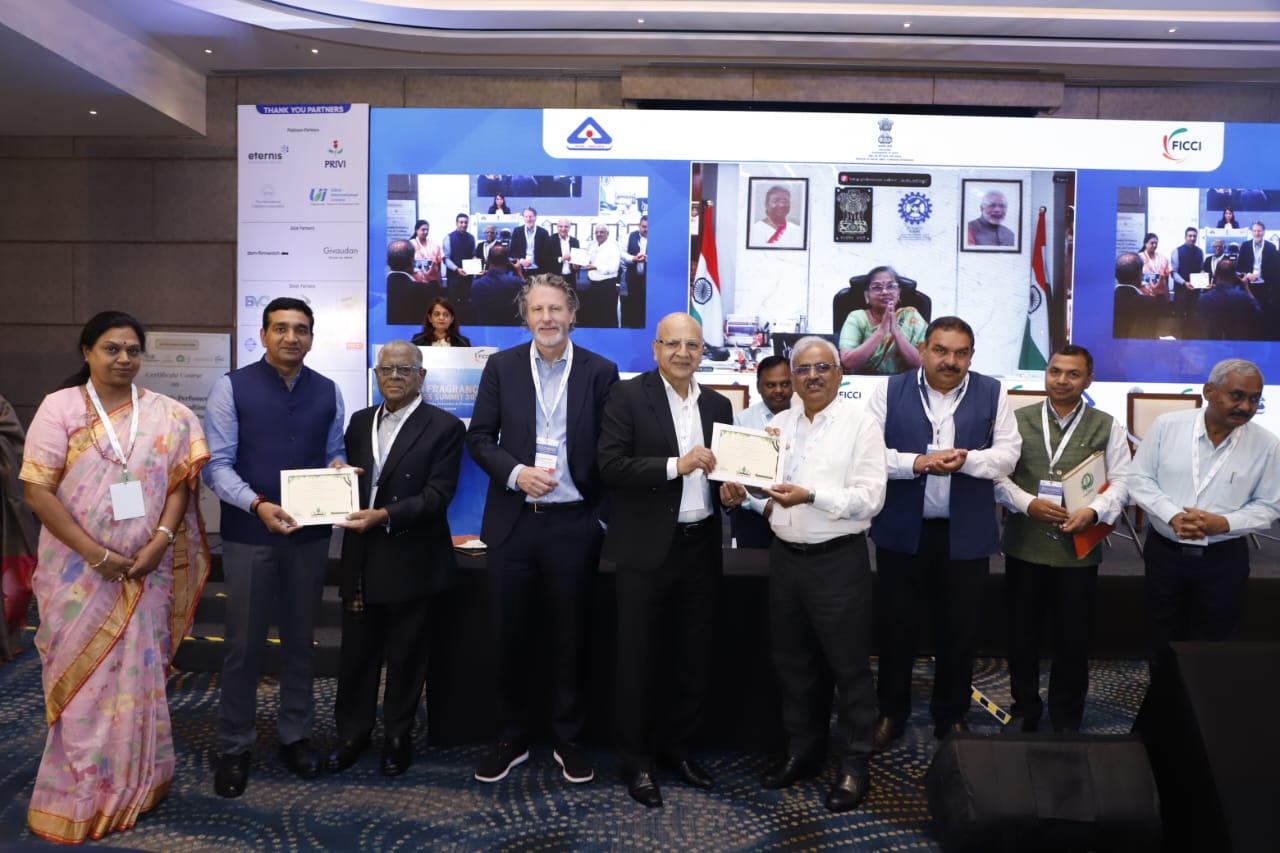Dr N. Kalaiselvi, Director General, CSIR, and Secretary, DSIR urges the need for Climate Resilient Crops under Aroma Mission at ‘FICCI Fragrance Summit’

FinTech BizNews Service
MUMBAI, 20 August 2025: Dr N. Kalaiselvi, Director General, CSIR, and Secretary, DSIR, Government of India, while addressing the 4th FICCI Fragrance Business Summit today urged the CSIR labs and the industry to focus on developing climate resilient crops under the Aroma mission of the country. In order to bring a decisive and transformative change in the rural economy, market dynamics and growth opportunity, Aroma mission was launched by CSIR which aims to provide end to end technology and value addition solutions across the country at a sizable scale. The Council of Scientific and Industrial Research (CSIR), under this mission, contributes significantly to the development, nurturing and positioning of essential oil based aroma industry in the country.

“Fragrance is not just about aroma, it is about science, technology, and the power to drive growth across diverse industries. Under Aroma mission, we are working closely with the farmers and tribals in different States to uplift their family incomes and provide better lifestyle,” she added and stated that that in Jammu & Kashmir, under the Lavander mission also known as Purple Revolution, farmers have shifted from traditional crops like maize to lavender cultivation, leading to higher incomes.
She emphasized that CSIR has been at the forefront of fostering R&D in essential oils, aroma chemicals, and natural extracts, while also encouraging stronger industry–academia linkages. Stressing the need for global positioning, Dr. Kalaiselvi observed that the Indian fragrance industry must build on its unique biodiversity and rich traditional knowledge to capture new opportunities worldwide. “We must align our innovations with sustainability, circular economy principles, and consumer preferences that are rapidly evolving,” she noted.
Dr Kalaiselvi called upon stakeholders to collaborate in creating a strong ecosystem that blends tradition with cutting-edge science. She added that policies and frameworks should not only support business growth but also ensure responsible sourcing, quality standards, and global competitiveness. “India has all the ingredients – talent, resources, and heritage – to emerge as a fragrance powerhouse,” she concluded.
The summit witnessed the signing of agreement between Memorandum of Agreement between CSIR-CIMAP, Lucknow, Sant Sanganeria Foundation, and Ultra International Ltd. for the development of four sustainable clusters under the Aroma Mission. This collaboration will empower farmers and women, especially from tribal communities, across Uttar Pradesh, Odisha, Tamil Nadu, and Meghalaya, benefitting around 100 farmers directly and over 1,000 indirectly.
Dr Alexander Mohr, President, The International Fragrance Association (IFRA), expressed his admiration for the country’s potential in the global fragrance market. He noted that while the industry is under growing regulatory pressures worldwide, IFRA continues to represent and defend the interests of the global fragrance community with policymakers. Highlighting India’s unique strengths, Dr. Mohr said that the country’s rich library of raw materials combined with a rapidly growing consumer base creates both challenges and extraordinary opportunities. He emphasized that for us, innovation begins with safety, and underlined IFRA’s commitment to supporting India’s growth journey with global standards and best practices.
Prof. Anju Srivastava, Principal, Hindu College, University of Delhi emphasized that the central challenge in education today is not just to bridge but to eliminate the gap between academic learning and industry expectations. She underlined the need to make education more skill-driven, industry-relevant, and capable of preparing students to contribute meaningfully from day one. In her remarks, she noted that collaboration between academia and industry is no longer optional but essential for building a future-ready workforce. She highlighted Hindu College’s pioneering initiative — the Certificate Course in Sustainable Perfumery, launched in collaboration with IFRA, Ultra International, and industry partners. She described it as a multi-disciplinary and employment-oriented program, combining science, sustainability, and skill training with internships and mentorship from leading practitioners. This, she said, reflects the vision of the National Education Policy by fostering innovation, sustainability, and employability. Dr. Srivastava urged continued cooperation between academia and industry to ensure India emerges as a leader in the global fragrance sector.
Mr Sant Sanganeria, Founder Chairman & MD, Ultra International Ltd. and Managing Trustee, Sant Sanganeria Foundation, spoke about India’s fragrance journey, describing it as a movement that combines tradition, innovation, and farmer empowerment. He highlighted how close collaboration between industry, government, and institutions like CSIR has transformed livelihoods from lavender fields in Jammu to rose valleys of Rajasthan, while also fueling start-ups that merge artificial intelligence with aroma science. Stressing the need for “vocal for local, local to global”, he called for expanding education in perfumery, creating aroma clusters, and supporting women, youth, and MSMEs to ensure India emerges as a global fragrance hub — rooted in sustainability, biodiversity, and the pride of “crafted with love in Bharat.”
Mr Michael Carlos, Chairman, FICCI Taskforce and Chairman Emeritus, The International Fragrance Association (IFRA), underscored the importance of education, capacity-building, and support for naturals in shaping the future of India’s fragrance industry. He noted the success of the first year of FICCI’s education programme with Hindu College, which is preparing young talent to become industry leaders. Emphasising India’s role as a vital source of naturals, he spoke about balancing growing global demand with regulatory challenges. He also called for creating a level playing field for small and medium enterprises, highlighting that innovation, safe product development, and new technologies like AI will open up opportunities for the next generation of perfumers.
Ms Bhuvna Nageswaran, Chair of the FICCI Fragrance Taskforce, highlighted the significance of the fragrance industry in India. While relatively smaller compared to other sectors, she emphasized that the industry holds a vital place in India’s economy due to its strong cultural and historical roots and its deep integration with agriculture, science, and industry.
She shared that the Indian flavour and fragrance industry is currently valued at USD 4.8 billion and contributes nearly 10–15% of the global demand for essential oils and aroma chemicals. This, she underlined, reflects both India’s growing footprint in the global fragrance value chain and the sector’s untapped potential for driving innovation and growth.